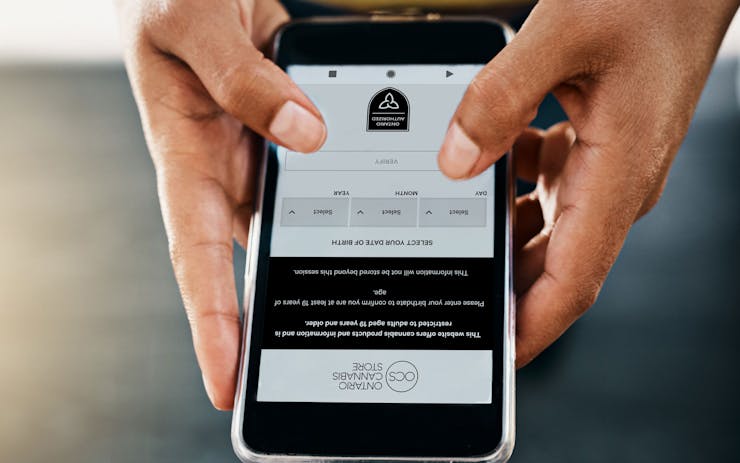Editor’s note: After we went live with the statement Health Canada released to Cannabis Act licensees, the agency clarified to at least twonews outlets that they only consider simple ‘one-click’ yes/no age gates to be non-compliant, leaving the door open to the kind of age gates that requires users to input an actual birth date, such as what is currently found on the OCS.ca homepage.
In a wide-ranging letter about promotion and packaging rules sent to licensed producers of cannabis, Health Canada warns that the self-attestation “age gates” found on websites with cannabis promotions “may be easily circumvented by youth.” In other circumstances, Health Canada says that some online promotional content is being made available without any steps to ensure youth cannot access them.
In all cases, Health Canada states that license-holders, “should immediately assess their online promotional content, and where necessary, implement additional steps to ensure youth cannot access promotional content.”Join the Leafly Canada CommunityThe letter notes that only “limited” promotion of cannabis is allowed.
The Cannabis Act states at section 17 that companies may make factual “informational promotion” about cannabis in certain circumstances, but that if it makes use of telecommunication (such as websites and apps) they must take “reasonable steps” to ensure youth cannot access the content.
Health Canada also notes that the same promotional rules apply to companies offering cannabis accessories, companies offering services related to cannabis, and provincially-authorized sellers of cannabis—ostensibly including government-run websites such as Ontario’s OCS.ca website that sell cannabis and currently only uses a self-attestation age gate.
The move could make promotional information about cannabis and cannabis-related products less accessible to Canadians.
It is important to note that the limitations only apply to “promotion” of cannabis, accessories, and related services, which the Act defines as representations for the purposes of selling the thing or service that is likely to influence and shape attitudes and behaviors about the service or thing.
For example, companies may circumvent promotion laws in some cases by contending specific promotions are meant to target investors with an investment opportunity. At least one cannabis company, The Green Organic Dutchman, has been known to deploy promotions regarding investment opportunities through Canadian daily newspaper and their digital platforms.
Other producers focus their outreach through the promotion of corporate social responsibility initiatives that they have formed with other companies, which may allow them to sidestep the cannabis promotion rules.
Cannabis companies have also sponsored charity events, possibly in an effort to bolster their name recognition. Canadian media reported last week that Canopy Growth had recently sponsored a children’s charity event. But with this specific form of outreach, companies must be careful because although sponsorships are permitted, promotions of the sponsorships cannot include cannabis brand elements, or the name of companies authorized to produce or sell cannabis.
Hexo, a commercial producer of cannabis, have deployed promotional content through apps like Snapchat. Instead of using an intrusive age-gate prior to the content appearing to users, the promotion would only appear to individuals who previously registered their profile with the app and indicated they were of age to view promotions. However, because the app is ultimately still ‘confirming’ the person’s age through self-attestation, this method of advertisement may also be targeted by Health Canada.
Companies promoting cannabis, related products and services have some solutions at their disposal that enable them to attempt compliance in accordance with Health Canada’s statement.
One available solution is through “Know Your Client” software that is already in use in other industries. Through the use of historical mobile phone records and utility data as verification points, users would be asked to enter their name and phone number, with the system verifying the person’s age in seconds. Companies offering this solution include SecureFact, Trulio, and Jumio.
Another solution would ask for the user to scan their government ID card, with the system verifying whether the person is old enough to view the content based on the birthday date on the card. At least one company, Inverite is offering this service.
How will the industry respond to the move? That’s to be determined, but don’t be surprised if it becomes harder to access promotional information about cannabis, accessories, and related services.





